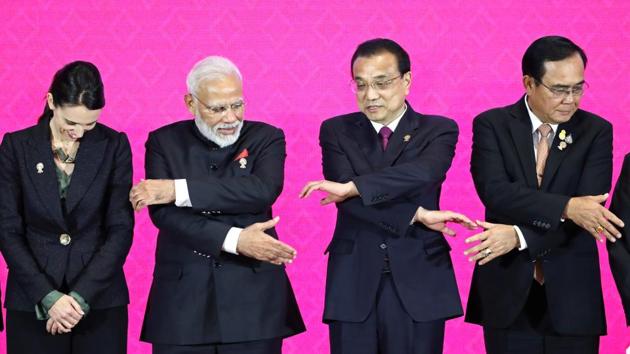Rejecting RCEP was the easy part | HT Analysis
The world is moving towards high-quality free trade deals, and India must follow that path too
Now that the dust has settled and the din subsided on India’s decision to stay out of RCEP (Regional Comprehensive Economic Partnership), it is time to step back and make a sober assessment of not only what happened but more importantly, what lies ahead.

In an ideal world, India should have joined RCEP. But the real world is messy and far from ideal. In a complex trade negotiation like this, a decision to join or stay away is made not just on geo-strategic criteria but also on the reciprocal balance of trade concessions granted and obtained. It is here that India came to the right conclusion that the RCEP partners were either unwilling or unable to accommodate its overriding concerns. There were six such.
One, India increased its tariffs on a range of items recently and obviously, if it agrees to bring down tariffs, the starting point has to be actual tariffs now, not what existed before. There was no agreement on this.
Two, safeguards against import surge requested by India did not find favour. China did not do enough to address its China-centric concerns of cheap imports flooding the market. Nor could the other RCEP partners influence China to do so. Japan’s Prime Minister is believed to have tried.
Three, India tried and failed to put in place a process for strict rules of origin so that there was no circumvention and the possibility of cheap imports flooding the country.
Four, RCEP partners are believed to have insisted that any trade concessions obtained by India elsewhere had to be made available to them on an MFN (most favoured nation) basis, something the country couldn’t agree to.
Five, there was no resolution of India’s concerns about non-tariff barriers vis-a-vis ASEAN and China.
Six, there were real fears here that dairy imports, especially from New Zealand would swamp the market and kill Indian co-operatives.
Seven, RCEP partners were less than enthusiastic about accommodating India’s interests in “Services” in general and “Mode 4” interests relating to movement of professionals, in particular.
Clearly, it was turning out to be a “lose-lose-lose” proposition for India. And the Government led by PM rightly said “No” to our RCEP partners.
Still, saying “No” to RCEP was the easy part. It is far more important for India now to see what lies ahead. The brutal fact of the matter is that the WTO-anchored, MFN-based regime that India banked on so heavily is drawing to a close. By some estimates, an overwhelming majority of international trade occurs on the basis of Free Trade Agreements (FTAs) or preferential tariffs. India has at least five trading partners, namely, the EU, US, Gulf Co-operation Council, China and ASEAN with whom bilateral merchandise trade is close to $100 billion each. Yet, the only one with which it has a FTA is, ironically enough, ASEAN. It is therefore imperative that India now move on and look at FTAs with its other trading partners. With China and ASEAN out of the way, that really leaves the EU, US and GCC. One thing that the Government can and must do is relaunch FTA negotiations with EU immediately and pick up the threads from where they were left off. Of course, the EU has since moved on and signed FTAs with Vietnam and MERCOSUR (the South American bloc) and its own expectations from India may be different. Be that as it may, India must try. A bilateral trade deal with the US also becomes crucial now.
The real worry is that the world is moving rapidly towards high-quality FTAs. Indeed, there are those who believe RCEP is a relatively low quality FTA. And when compared to USMCA (United States–Mexico–Canada Agreement) or CPTPP (Comprehensive and Progressive Agreement for Trans-Pacific Partnership), some may argue that RCEP is indeed less all-encompassing. So, if India finds joining RCEP difficult, it may find the evolving international trading environment unfriendly, if not downright hostile. This is where the Government must step in and ask the private sector to shape up. Barring agriculture which will always be sensitive and deserves protection, other sectors cannot expect to be mollycoddled forever. There is an imperative need for the commerce ministry to look at FTAs such as EU-Vietnam, USMCA and CPTPP especially with regard to areas such as IPRs (intellectual property rights), investment, tariff and non-tariff barriers, environment, and e-commerce. Provisions relating to these subjects contained in the above FTAs will, whether India likes it or not, become the norm over time. And if India aspires to be a $5 trillion economy, work on this has to start now to modernise laws and regulations. Historically, India has carried out economic reforms out of compulsion, not conviction. Perhaps the time has come for it to carry out painful economic reforms not because of external pressure, but because it is profoundly in national interest to do so.



